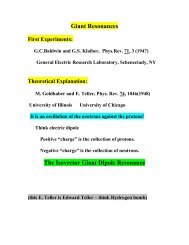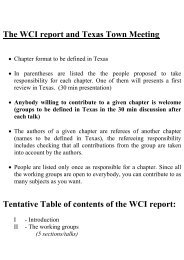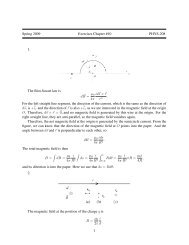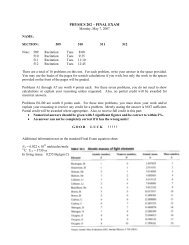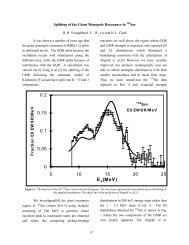CHAPTER 4. THERMODYNAMICS: THE FIRST LAW
CHAPTER 4. THERMODYNAMICS: THE FIRST LAW
CHAPTER 4. THERMODYNAMICS: THE FIRST LAW
Create successful ePaper yourself
Turn your PDF publications into a flip-book with our unique Google optimized e-Paper software.
F. Thermochemistry<br />
4-13<br />
A very important application of thermodynamics to chemistry is the study of the heat released<br />
or absorbed in a chemical reaction. Chemical reactions are most commonly carried out at constant<br />
pressure (i.e., in an open vessel) and for this specified path, the heat changes are the same as the<br />
enthalpy changes. Since enthalpy is a state function, it is possible to calculate the change in enthalpy<br />
accompanying a chemical reaction simply from a knowledge of the enthalpies of the reactants and<br />
the enthalpies of the products. In actual, practice, enthalpies for chemical reactions may be<br />
o<br />
determined from tabulated standard enthalpy changes, denoted by the symbol H . The term<br />
standard means that the enthalpy change is for a reaction in which the reactants and products are in<br />
their so-called standard states.<br />
Standard state:<br />
the pure substance at a specified<br />
temperature and a pressure of 1 bar.<br />
Although enthalpy changes may be tabulated for any temperature, the most common tabulations are<br />
for 298 K.<br />
1. Enthalpy of formation<br />
The most useful thermochemical tabulations give standard enthalpies of formation denoted<br />
o<br />
by the symbol fH .<br />
Standard enthalpy of formation:<br />
the enthalpy change accompanying the formation of a<br />
substance in its standard state from the most stable forms of<br />
the constituent elements of the substance in their standard<br />
states.<br />
For example, the standard enthalpy of formation for benzene is the enthalpy change for the reaction<br />
6C + 3H ! C H .<br />
(s,gr) 2(g) 6 6(l)




